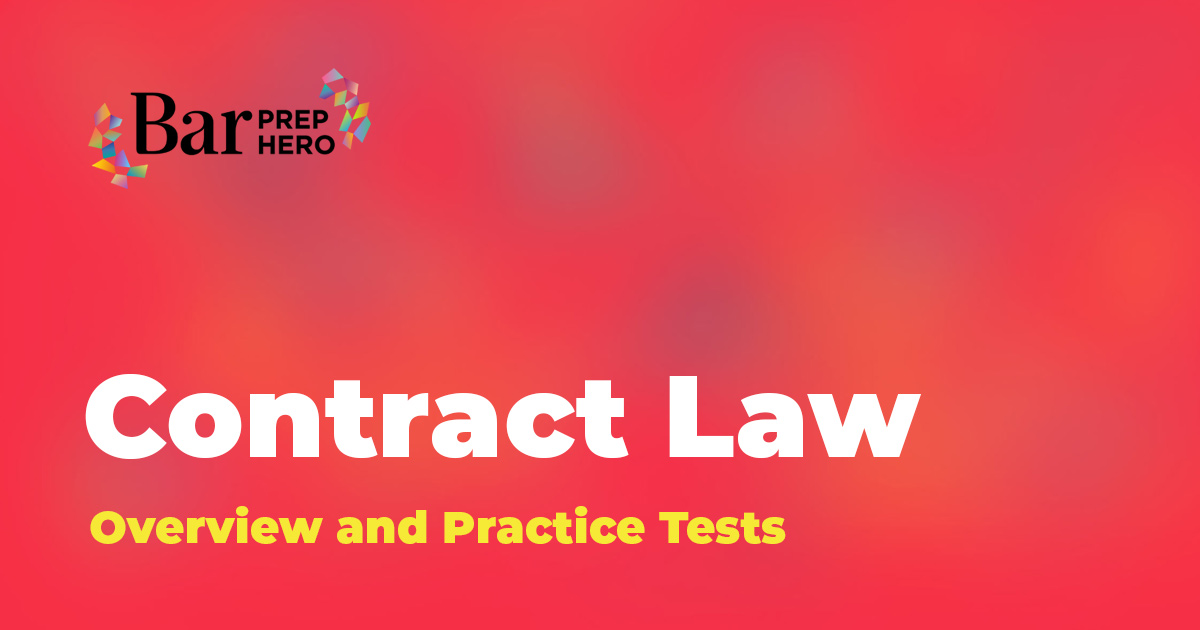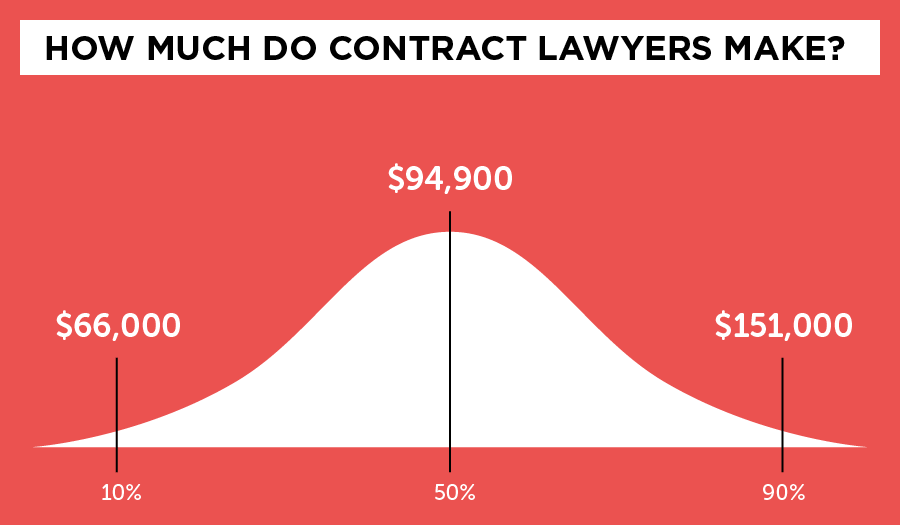Contract Law
Overview and Practice Tests
 By Andrei Zakhareuski, BarPrepHero, Founder/CEO
By Andrei Zakhareuski, BarPrepHero, Founder/CEO
More help for you
What is Contract Law?
Contract law is the branch of law that deals with making contractual agreements and enforcing them in court. Contracts are made between parties, often but not always in a business relationship, that govern the terms of their relationship and provide remedies for breaking the terms of the contract. These remedies are often decided and enforced in a court of law. The aim of contract law is to make sure parties enter contractual agreements with full knowledge of what their rights and responsibilities are, as well as the agreement they are entering into. When someone breaches the agreement, then contract law aims to remedy the breach and make sure the parties involved receive what is fair.
Start Preparing for Your Bar Exam Now
Types of Contracts
There are several different kinds of contracts, but there are basic elements required for any contract to be valid. First, a party makes an offer to another. Then, the other party must accept the offer. Lastly, most contracts require what is called consideration, which is something of value given by each party. If these elements are met and both parties intend to be parties to the contract, then a valid contract is formed.
Outside of these basic elements, there are several different kinds of contracts that can arise under contract law.
Under Seal
Contracts under seal are contracts that are formalized in writing or print, and contain the seal of the person or entity signing the contract. These contracts differ from traditional contracts in that they do not require anything of value to be given between the parties.
Express Contracts
Express contracts are oral or written contracts in which the terms of the agreement are clearly stated, and the terms may not be substituted. Whatever terms are stated in the contract cannot be altered, and whatever the contract states will govern.
Implied
Implied contracts arise when there is no contract in writing, but the facts or the law warrants an obligation between the parties. There are two types of implied contracts: implied-in-fact and implied-at-law. Implied-in-fact contracts arise when the conduct of two parties suggests that an agreement was in place, even if there was no writing to govern the agreement. Implied-at-law contracts are created when a court will enforce an agreement because it would be unfair to one party not to enforce it.
Executed and Executory
An executory contract is a contract in which both sides still have something that they need to do. For example, if a contract is made to paint a house for payment, the contract is executory until one party paints the house and the other party renders payment for the job. Once performance is performed on both sides, the contract has been executed.
Bilateral and Unilateral
A bilateral contract is a contract in which there is an agreement between two people or groups. Most traditional contracts are bilateral contracts.
A unilateral contract is an agreement or promise made by one person to do something in exchange for something else. Nobody is obligated to perform the contract, but if someone does, then the person must fulfill the obligation. An example is offering an amount of money for returning a lost item. Nobody has to return the item, and if they do not, the person does not have to fulfill the promise to give reward money. But if someone does choose to perform the act of returning the lost item, then the promisor fulfills the promise to pay the reward money.
Unconscionable
An unconscionable contract is a contract that is legally unenforceable because it is so one-sided that it is unfair to one party. It doesn’t leave any real room to bargain, and is so unfair that it “shocks the conscience.”
Adhesion Contracts
Adhesion contracts are contracts with a big difference in bargaining power between the parties. The adhesion contract is presented on a “take it or leave it” basis with nonnegotiable terms. Adhesion contracts may also be called “boilerplate contracts,” and they contain the same terms and conditions for every person who enters into the contract. An example of an adhesion contract is an insurance policy, where the insured person cannot negotiate the terms of the contract, and every insured person is subject to the same terms and conditions.
Aleatory
An aleatory contract is a contract in which performance by one party is contingent on an uncertain event. Usually, the amount paid by the parties under the contract are unequal. An insurance policy is an example of an aleatory contract, because although the insured pays a monthly premium, the performance of the insurance company is dependent on something happening before they will make a payment.
Void and Voidable
A void contract is an illegal and unenforceable contract that is treated by the courts as if there is no contract. A contract that requires somebody to do something illegal is an example of a void contract.
A voidable contract is a valid contract that can be enforced, but can also be voided by one party. For example, if somebody is underage when they enter into the contract, the contract is voidable by that person when they reach legal age. When the minor reaches legal age, he or she may cancel the contract if he or she does not wish to be bound by the contract; but if he or she decides to enforce the contract, the other party is bound and does not have the option to cancel the contract.
How to Become a Lawyer
First, to become a contract attorney, one must earn a bachelor’s degree and graduate with good grades. It is recommended, but not required, to earn a degree in a legally-related field, such as criminal justice or political science. Before applying for law school, you must take the LSAT and get a good score. Once enrolled in law school, a student will spend three years studying different legal topics, and receive a law degree, referred to as a Juris Doctorate (J.D.).
During law school, and even before law school, it is very helpful to gain legal experience, preferably in the field of practice one is interested in. Students can gain experience through internships, part-time jobs with local law firms, or programs or activities available through the school. There may also be classes in school that will be helpful, such as contract drafting.
After graduating from law school, students must pass the Multistate Professional Responsibility Exam (MPRE) and the State Bar Examination. The MPRE governs professional responsibility of attorneys in the legal field. The State Bar Exam may contain any variation of the Multistate Bar Examination (MBE), Multistate Essay Examination (MEE) or State-Specific Essay Examination, State-Specific Civil and Criminal Procedure and Evidence Exam, and Multistate Performance Test (MPT).
After successfully passing the required tests, you can apply to the State Bar for a law license and get sworn in to practice as an attorney. Many people will receive offers from the law firm they worked for during law school to become a full-time practicing attorney there. Other firms you apply for might want specialized experience in contract law, which is where earning practical experience during law school will come in handy.
Requirements
- Bachelor’s Degree with a good GPA (preferably in a pre-law track, but not required)
- Juris Doctorate Degree (J.D.)
- MPRE and State Bar Exam passage
- Admittance to the State Bar
- Specialized experience in contract law
Job Description and Duties
The main duties of a contract attorney are to draft and revise legal contracts, to explain to their clients the terms and conditions of contractual agreements, and to represent their clients when legal action is necessary for a contract. Contract attorneys often work in a transactional firm environment, and may not be in court very often. Contract attorneys must be familiar with the relevant contract law of their state, the different types of contracts, and what their clients hope to gain out of any contractual relationship they enter into.
Salary Information and Employment Outlook
The average salary of a contract attorney is $94,900, with salaries ranging from $66,000-$151,000 and bonuses ranging from $0-$14,000. The projected job growth for attorneys is 8% from 2016-2026, according to the U.S. Bureau of Labor Statistics (BLS).

Contract attorneys can work in a small or large firm environment, or as in-house counsel for large companies. They can also offer support to litigation teams and give advice on company policies and standards.
If you are in the middle of your journey towards becoming a contract attorney, we are here to help. With free MBE practice tests, you will feel confident walking into your bar exam. Additionally, we have a premium program where we guarantee you will pass.

